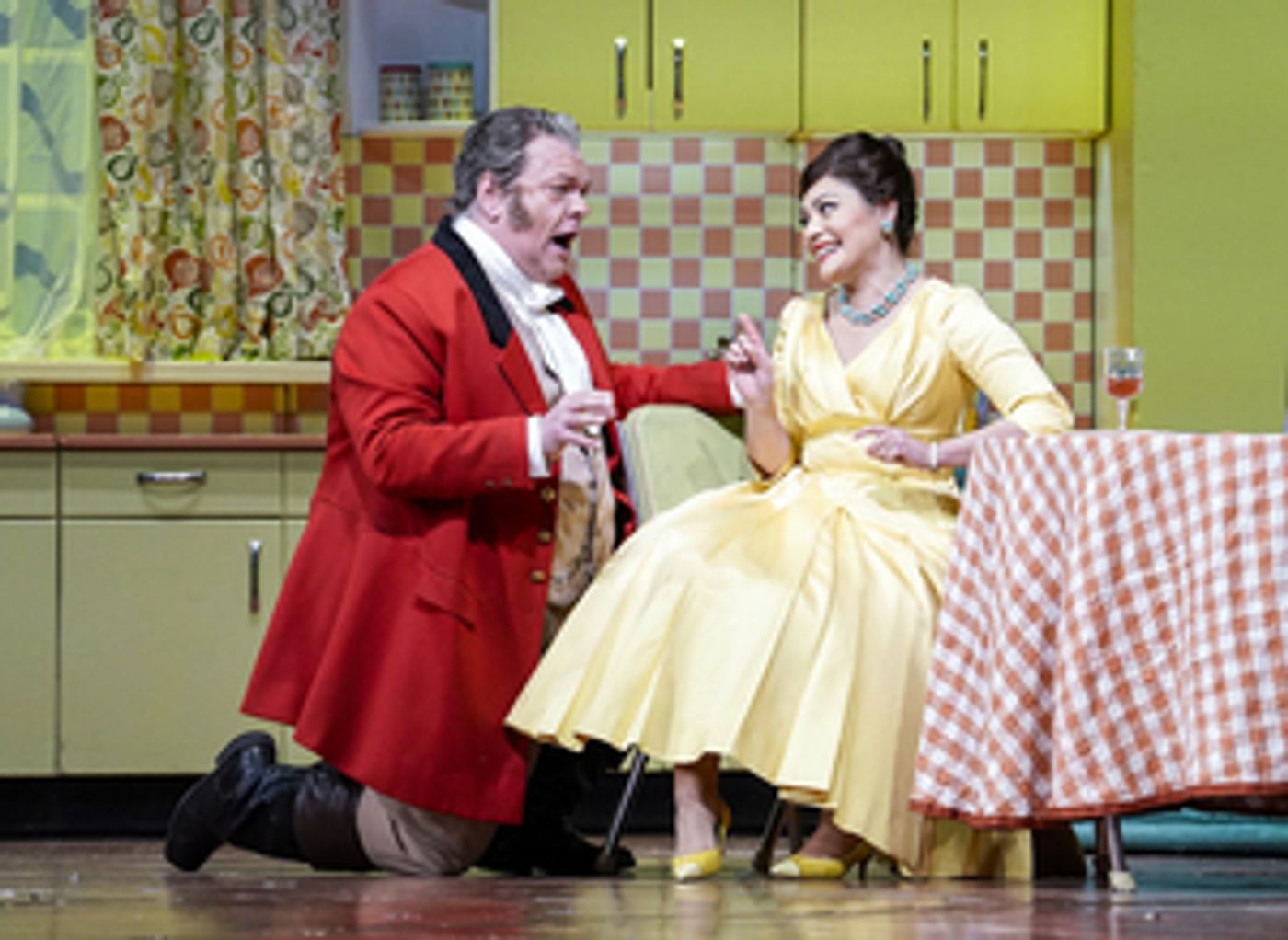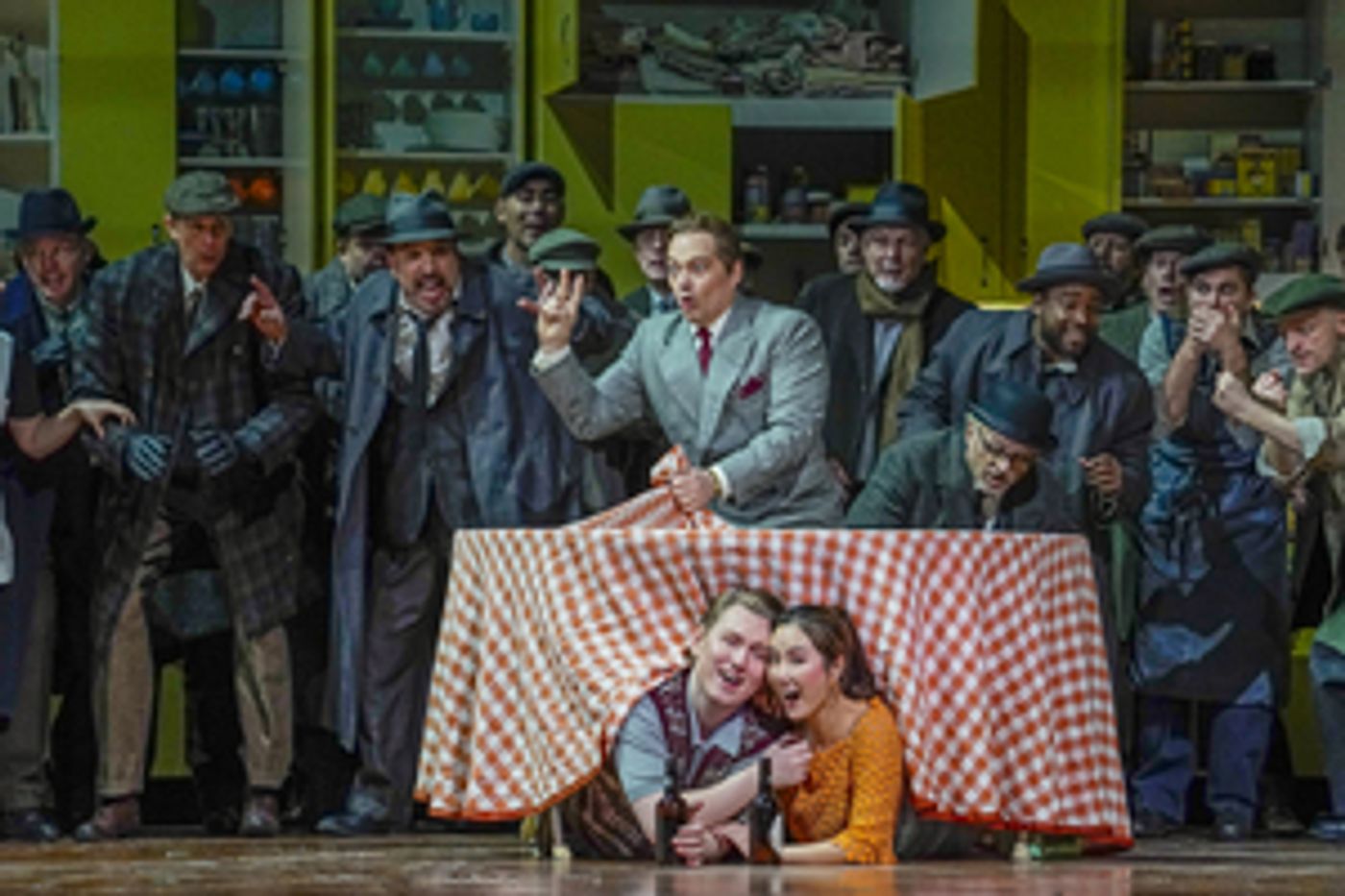Review: Shakespeare's Merry Wives Get the Best of a Grand Michael Volle in Verdi's FALSTAFF
Perez, Johnson Cano, Lemieux, Park, Volkov, Maltman Also Sing Major Roles under Rustioni’s Baton

Combine a supreme farceur with a stentorian voice that thrills and you get baritone Michael Volle's portrayal of the title role in Verdi's FALSTAFF, which breezed into town late last week for a limited run at the Met.
While we've had dramatic singers in the role before, they were mostly from Italian repertoire; I don't know when the last time a Wagnerian--a Wotan from the Ring, for instance--took on this role around here, but Volle did himself proud.
And he was surrounded by a first-rate cast of singing actors from top to bottom. They included the charmingly full soprano of Ailyn Perez (Alice), the brash mezzo of Jennifer Johnson Cano (Meg) and the booming contralto of Marie-Nicole Lemieux (Quickly) as the merry wives of Windsor (joined by silver-voiced Hera Hyesang Park as ingenue Nannetta Ford), the often obnoxious, sometimes Elvis-y, always game baritone Christopher Maltman (Ford), the golden tenor of Bogdan Volkov (Fenton) as Nannetta's beloved.

Photo: Karen Almond/Met Opera
The Met orchestra was clearly enjoying itself, and sounding very fine, under the careful and fun-loving baton of Maestro Daniele Rustioni, in the revival of Robert Carsen's smashing production; this revival was in the hands of Gina Lapinski.
But it's Volle who is the solid center of the piece, thanks to the composer and his superb librettist, Arrigo Boito. They used all the Shakespeare plays that feature Sir John Falstaff to create an unforgettable character for the opera and fleshed out musically.
Wheedling and cajoling his way through life, he believes in himself as lady-killer who's absolutely irresistible to women, even if he hardly fits that description to anyone else. (Verdi himself referred to the title character as 'Big Belly.')

Photo: Karen Almond/Met Opera
In arias like "Quando era paggio" and "Va vecchio John," Falstaff ties the past and present together and Volle portrays this superbly. Even when he's at a low point--after being thrown into the river and is sitting around a barn in his filthy long-johns, keeping company with a horse--he never quite loses his dignity, even if it's only in his own mind.
While Rossini and Donizetti were kings of mixing great comic operas--BARBIERE, L'ITALIANA, FILLE DU REGIMENT, ELISIR and DON PASQUALE--along with their serious ones, Verdi was known primarily for his dramas. While the others showed lightness in their comic pieces, Verdi gave his FALSTAFF heft, while landing all the jokes as well. No small trick.
Keeping that balance between comedy and heavier writing is delicate indeed but the creators knew what they were doing.

Photo: Karen Almond/Met Opera
For example, the comic shenanigans of Pistola (Richard Bernstein) and Bardolfo (Chauncey Packer) are priceless, as is the Dr Caius of Carlo Bosi, who thinks he's marrying Nannetta--only to find that she's been replaced by Bardolfo. The chorus gets quite a workout in several places and, under Donald Palumbo, was decidedly up to the challenge.
Carsen's production--with Paul Steinberg's delightful sets (especially the Fords' '50s kitchen in Act II and the forest in Act III) featuring Peter Van Praet's lighting, and Brigitte Reiffenstuel's midcentury modern costumes--is certainly one of my favorites at this moment in the house, even if the pace of the scene-changing is torpid, despite the Met's 21st-century technology.
There are only three more performances of Verdi's FALSTAFF at the Met this season: Thursday Mar. 23 (7:30 pm), Wednesday Mar 29 (8pm) and the matinee on Apr. 1 (12:30pm). For more information about the opera and tickets, see the Met's website.
Reader Reviews
Videos

